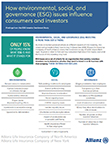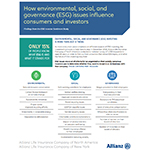MINNEAPOLIS--(BUSINESS WIRE)--Although much of the global attention within the ESG (Environmental, Social and Governance) sector of investing has been placed on the environmental component, the ESG Investor Sentiment Study* from Allianz Life Insurance Company of North America (Allianz Life®) found that in the U.S., social and governance issues are equally important as or more important than environmental record when consumers decide whether or not to invest in or do business with a company. Furthermore, the study found that a company’s ESG profile plays a significant role in its overall reputation as a majority of consumers believe companies focused on ESG issues have better long-term prospects.
When asked about the importance of a variety of ESG topics in making a decision to invest in a company, 73% of American consumers noted environmental concerns like natural resource conservation or a company’s carbon footprint/impact on climate change. However, the same percentage emphasized social issues such as working conditions of employees or racial/gender equality, and 69% highlighted governance topics like transparency of business practices and finances, or level of executive compensation, as being significant in their decision making.
A similar preference for positive social and governance results was even more pronounced in relation to consumers’ decisions to actually do business with a company. More than one-third (34%) of respondents said a company’s stance on social issues was the most important factor followed by 27% who indicated corporate governance issues were a top priority. Less than a quarter (22%) cited a company’s record on environmental issues as their chief concern.
“ESG investing has taken on more prominence in recent years as consumer interest has driven the ESG engagement we’re now seeing within the investment space,” said Todd Hedtke, chief investment officer for Allianz Investment Management LLC. “While environmental factors are certainly important, the average investor in the U.S. is just as interested in a company’s social and governance practices before they make investment decisions. From a business perspective, companies need to pay attention to the fact that ESG is not some passing fad. Companies that view this as an opportunity to make changes are likely to realize a positive impact in both the near- and long-term.”
Actions speak louder
When it comes to investments, most consumers agree that a focus on ESG makes good financial sense. Nearly 80% said they “love the idea of investing in companies that care about the same issues” they do, and 74% believe an ESG investment strategy is “not only one that you can feel good about, but one that makes long-term financial sense.” A full 71% percent also said they would stop investing in a company if it behaved in ways they consider unethical.
However, a significant gap still exists between what people say is important and how they actually invest. More than three-quarters of respondents said the following ESG issues were important in their decision to invest: provides safe working conditions for employees (84%); transparent in their business practices and finances (81%); provides living wages to employees (80%); provides quality health insurance to their employees (78%); and conserves natural resources (76%).
Yet, less than half said they chose to invest/not invest based on those same business practices: provides safe working conditions for employees (42%); transparent in their business practices and finances (44%); provides living wages to employees (40%); provides quality health insurance to their employees (42%); and conserves natural resources (44%).
“Although many people remain skeptical about actual returns from ESG-focused investments and are confused about what qualifies as an ESG investment, investors still see value in supporting businesses with strong ESG practices,” said Kelly LaVigne, vice president of Consumer Insights for Allianz Life. “As information about the way companies operate becomes more readily available to average investors, we anticipate an even stronger focus on ESG performance. Greater awareness and education on ESG topics will help bridge any existing information gaps on the true importance of ESG.”
Reward rather than punish
While a discrepancy exists between beliefs and investment actions, investors more often choose to reward companies for good behavior rather than punish them for issues where they don’t align.
Among the 16 different ESG issues highlighted in the study, 11 issues were more influential in investors’ decision to actively invest, including carbon footprint/impact on climate change, charitable contributions, involvement in reducing poverty and wages provided to employees. Only two issues were more influential in causing people to stop investing: animal testing and donations to political candidates/PACs.
For a complete list of ESG issues that impact investment decisions, as well as additional data from the ESG Investor Sentiment Study, visit www.allianzlife.com/ESG.
About Allianz Life Insurance Company of North America
Allianz Life Insurance Company of North America, one of the FORTUNE 100 Best Companies to Work For® in 2019, has been keeping its promises since 1896 by helping Americans achieve their retirement income and protection goals with a variety of annuity and life insurance products. In 2018, Allianz Life provided $2.8 billion in benefit payments that helped policyholders’ achieve their financial goals. As a leading provider of fixed index annuities, Allianz Life is part of Allianz SE, a global leader in the financial services industry with over 142,000 employees in more than 80 countries. Allianz Life is a proud sponsor of Allianz Field in St. Paul, Minnesota, home of Major League Soccer’s Minnesota United.
*Allianz Life Insurance Company of North America conducted an online survey, the Allianz Life ESG Investor Sentiment Study, in December 2018 with a nationally representative sample of 1,000 respondents ages 18 years or older.




